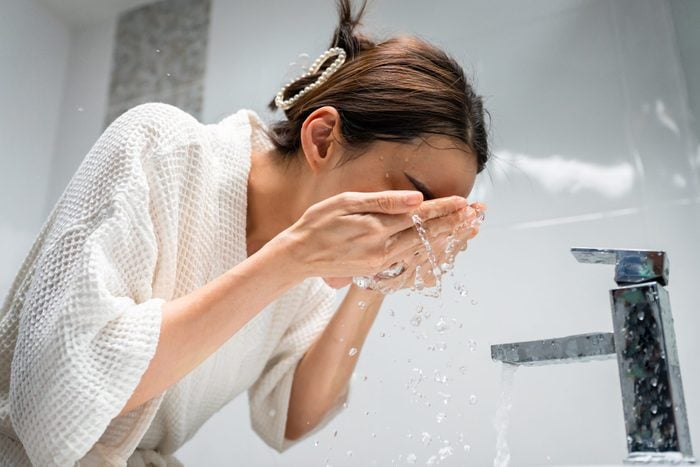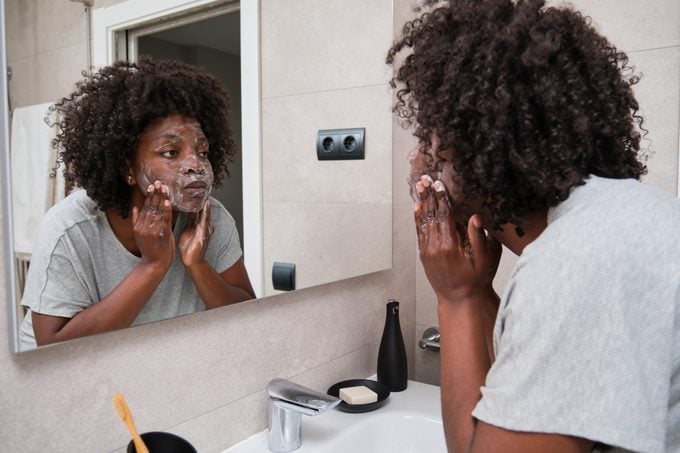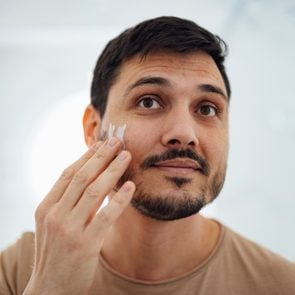Here’s What Happens When You Don’t Wash Your Face (Hint: It’s Not Pretty!)
Updated: Apr. 12, 2024

We asked dermatologists how often you should wash your face—plus what happens if you slack on cleaning your skin
Washing your face is the first step in a good skin-care routine. In fact, most experts agree that it is a crucial aspect of maintaining skin health—more important than picking the best face wash or using a trendy face-cleansing brush. “Washing your face helps to remove the dirt, oil and other environmental pollutants and impurities that build up and collect on your face throughout the day,” explains Lauren Penzi, MD, a board-certified dermatologist at MDCS Dermatology. So, how often should you wash your face?
The truth is, the answer varies from person to person. Some people may benefit from double cleansing (more on that later), while others can get away with just a gentle face wash. But not washing your face? Well, it can lead to breakouts and a number of other not-so-great skin issues.
To help you figure out the right face-washing regime for your skin’s specific needs, we spoke to dermatologists to get their top tips—including more info on why skipping this step is a big no-no, how to make sure you cleanse properly and which skin-care brands put out the best face washes.
Get Reader’s Digest’s Read Up newsletter for more beauty, humor, cleaning, travel, tech and fun facts all week long.
Why is it important to wash your face?
You wouldn’t go days and days without washing your hands, right? So you shouldn’t go days and days without washing your face. It’s exposed to quite a bit, after all. Things like makeup, smog and sweat can all sit on your skin. And if you let that stuff build up, it can cause enlarged pores, breakouts, dullness and more.
Washing your face can remove dirt, oil and environmental pollutants, as well as wash away makeup, explains Dr. Penzi.
How often should you wash your face?
“For most people, twice daily is the ideal frequency for face washing,” says Hadley King, MD, a board-certified dermatologist in New York City. “Ideally, it would be once in the morning and once before bedtime.”
Go overboard on the cleansing, and your skin will start to feel dry, tight and irritated—signs you’re washing too much, she says.
Regardless of skin type, dermatologists generally don’t recommend washing more than twice in a 24-hour span. “It can strip away the skin’s natural oils and lead to irritation,” says Dr. Penzi. And yes, that guidance goes for people following an oily-skin routine too. You may be tempted to wash more often than twice daily—but don’t do it! Stripping your skin can send your oil glands into overdrive, making your skin even greasier.
There are, of course, exceptions to the “how often should you wash your face” rule. For example, if you work out midday or do some other activity that causes you to sweat a lot, using a gentle cleanser to wash your face is smart.
What can happen if you don’t wash your face?
If you fall asleep with makeup on once in a blue moon, it’s probably not a big deal. But repeatedly skipping this cleansing step is a bad idea. Here are all the things that can happen when you skip washing your face regularly.
You may notice more breakouts
“When you don’t wash your face, dirt, bacteria and other impurities will build up on your skin,” says Dr. Penzi. The result: “Your pores are more likely to get clogged, leading to acne,” she adds.
This is especially true if you wear makeup. When makeup wearers skip cleansing, oil, bacteria and pollutants build up on top of their cosmetics, clogging pores even more. All that’s to say, not cleansing is seriously one of the biggest makeup mistakes you can make.
Your skin may age more quickly
Pollutants and free radicals can build up on your skin throughout the day. If you don’t wash them off, they can damage collagen and elastin fiber—leading to premature aging, says Dr. Penzi.
Say what?! Free radicals and pollutants are things carried in the air (think smog, smoke, dust and even particles from household cleaners). These tiny molecules can land on your face and cause damage to your skin’s collagen and elastin fibers, two things that help keep your complexion plump and youthful looking. Whether you’re following a skin-care routine in your 30s or a routine for aging skin, washing your face is a must.
Your pillows will get super dirty
All that dirt that builds up on your face throughout the day? Well, if you don’t wash it off, it won’t simply stay on your face. When you sleep, it can rub off onto your pillow. This means your pillowcase will get pretty funky.
Not only that, but you may kick off a vicious dirt-transferring cycle. See, you’ll transfer oil, grime and makeup to your pillow. Then, even if you wash your face the next night, you’ll lay your clean skin on that pillow and expose it to that caked-on grime. This can dirty your face and encourage breakouts.
Your other skin-care products may stop working as well
It’s simple: Skin-care products like serums, moisturizers and other creams are more easily able to penetrate clean skin. When you have buildup on your face from not washing, those products will likely just sit on top of your face, rather than get absorbed so they can work their magic.
But wait! There’s more: Because those products don’t absorb, they dry on top of your skin and add to that buildup. This can increase your chances of breaking out. It may also dry out your skin because your daily moisturizer isn’t soaking in.
Should you use soap every time you wash your face?

Now that you understand the importance of scrubbing your mug daily, it’s time to get into the nitty-gritty details: How often should you wash your face with a cleanser? Should you always use soap or face wash, or will simply splashing water onto your skin do the trick?
According to the dermatologists we talked to, it depends on your skin type and the products on it. If you have oily skin, use a gentle cleanser every time you wash. The same goes if you have anything sitting on your skin, like makeup, sunscreen or an overnight face mask. “However, if you have super-sensitive or dry skin, you may want to skip the a.m. cleanser and just use water on your face,” Dr. King says.
As for those with normal skin, our experts say to use your judgment. During the winter months, when skin tends to be dryer, you may want to skip cleanser in the morning in favor of using only water. On the flip side, in warmer months, you may want to make sure you use a cleanser in the morning—it’s more likely you’ve done some sweating since the last time you washed.
What’s the best way to wash your face?
Even more important than washing your face is knowing how to wash your face. For starters, skip the scalding water when you are cleansing—it can irritate the skin. (A reason you really shouldn’t wash your face in the shower.) “Lukewarm water will help thoroughly clean your skin without totally stripping it of natural oils,” says Dr. King. Dr. Penzi adds that warm water helps open pores better than cold water, and this can help you unclog pores as you wash.
With that important warning out of the way, the experts recommend these easy-to-follow steps:
- Wet your face.
- Use clean hands to gently rub cleanser over your face in small, circular motions for one to two minutes.
- Rinse with lukewarm water.
- Pat your face dry.
One mistake Dr. Penzi sees a lot of people make when cleansing is being too aggressive. “Do not use an abrasive washcloth or sponge—these can be too harsh and will break down the skin’s natural barrier,” she says. “Using your fingertips in a circular motion is sufficient.”
Another tip that may just stop your next breakout before it starts? Always pat your face dry with a clean towel so you don’t reintroduce dirt or bacteria after cleansing.
What should you consider when choosing a cleanser?
Washing your face may be the important part of a skin-care routine, but using a cleanser that won’t damage or irritate your complexion is also a big deal. If you have special skin needs, consider choosing a cleanser for your skin type. For example, if you have dry skin, a creamy cleanser featuring hyaluronic acid can remove makeup, sunscreen and dirt while maintaining hydration. Acne-prone? Opt for a cleanser with blemish-busting salicylic acid, such as Cetaphil’s Gentle Clear face wash.
Both Dr. Penzi and Dr. King say a gentle cleanser works for all skin types. “Look for formulas that are fragrance free, hypoallergenic, pH balanced and dermatologist approved,” suggests Dr. Penzi.
Dr. King adds that formulations containing humectants (such as hyaluronic acid and glycerin) and emollients can help hydrate and maintain your skin’s integrity. Face Reality’s Ultra Gentle Cleanser is a great option, she says.
About the experts
- Lauren Penzi, MD, is a board-certified dermatologist at MDCS Dermatology, which has locations in New York City, New Jersey and Long Island. She is a member of the American Academy of Dermatology, American Society for Dermatologic Surgery, Society for Pediatric Dermatology, American Society for Laser Medicine and Surgery, and the Women’s Dermatologic Society.
- Hadley King, MD, is a board-certified dermatologist in New York City. She is also a clinical instructor of dermatology at the Weill Medical College of Cornell University.



